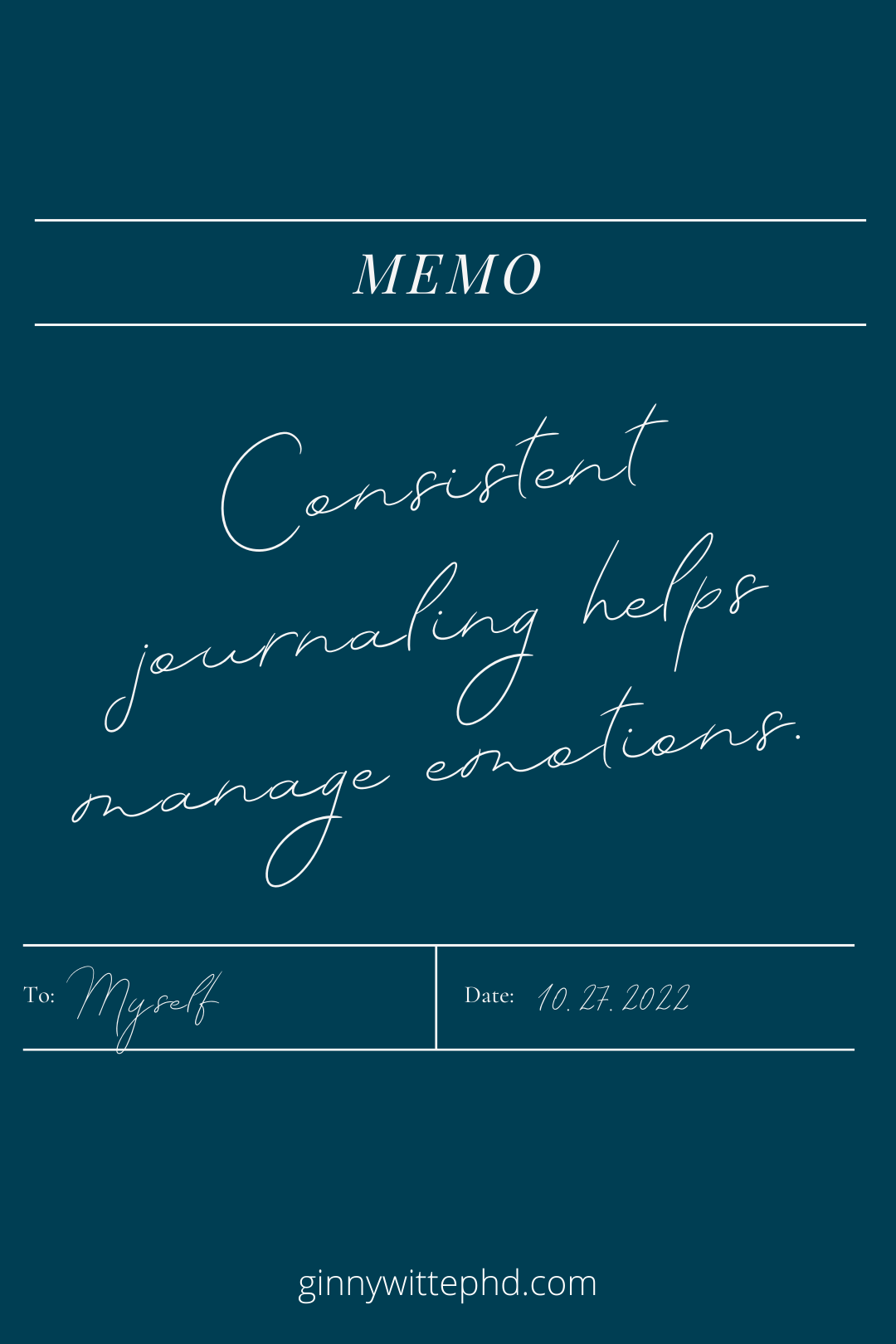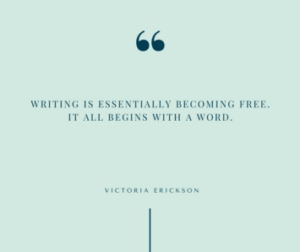
“Trauma is a story waiting to be heard.” Ginny Witte
We all go through seasons where life seems overwhelming, and most people don’t realize how much journaling helps us cope with these phases. Life’s journey will take you down many winding roads, and on your travels you will come face to face with life, death, joy, loss, grief, and pain. Sometimes life brings a sudden change in emotions that can feel like a massive windstorm, pushing and pulling you around. You feel knocked down, pushed around, and shaken up.
 Sometimes, it’s the little stresses that become chronic and build. One researcher believes that when we hold trauma inside, the work of inhibiting the trauma itself becomes a stressor. When the stresses of life become larger than your body’s capacity to cope, it can result in trauma.
Sometimes, it’s the little stresses that become chronic and build. One researcher believes that when we hold trauma inside, the work of inhibiting the trauma itself becomes a stressor. When the stresses of life become larger than your body’s capacity to cope, it can result in trauma.
Journaling can help!
Though you want to hold these feelings in, hoping that you won’t feel them, they eventually erupt as big emotions in unhealthy ways. However, you can do the opposite. By grabbing a pen and paper, you can journal about traumatic experiences, let the feelings flow out, and let them go.
Expressive writing is a form of journaling that creates a wonderful connection between the mind and the body. Expressive writing can help release trauma.
Holding traumatic memories can create a state of being ‘stuck `in the body. In this state your body creates a feedback loop where the same patterns of thoughts and behaviors repeat themselves over and over again, making it hard to move forward in life.
Being stuck feels like the break is on, while at the same time the gas pedal is down to the floor.
James Penneaker at the University of Austin has researched the link between holding in painful emotions and physical and mental health. He has found when individuals write about their painful experiences, they feel better and have fewer visits to the doctor. It’s like releasing the brake. Through journaling you can release the brake slowly. You can also adjust the gas pedal.
What Is Expressive Writing and How Does Journaling Help?
Expressive writing is a way of unfiltered writing that gets your thoughts and feelings out of your head and onto paper. The process of letting go, or expressing your thoughts and feelings has been shown to result in several health benefits.
Pennebaker (1986) has identified the following benefits of expressive writing:
➔ Lower anxiety and depression
➔ Improvement in overall well-being
➔ Lower blood pressure
➔ Reduced stress
➔ Support for your immune system
➔ Improved mood
The process of writing seems to be especially helpful for those who have had difficult emotional experiences, tend to ruminate, or tend to be emotionally expressive.
All this by simply getting pen to paper for 15 minutes each day. This simple, yet highly effective tool can help you feel better and heal.
So how exactly does journaling help?
1. Journaling Helps Process Emotions
Putting experiences to words
 A form of journaling called expressive writing, has positive effects on your emotional health. Pennebaker (2017) found that individuals who were not able to express their trauma, but held it in, experienced more health problems later in life. Pennebaker believes that the ‘holding in’ of trauma secrets is in itself stressful. A key component to processing emotions, says Pennebaker, is putting your experiences into words. Journaling is a platform that helps you communicate your experiences, find your voice, and put your words on paper.
A form of journaling called expressive writing, has positive effects on your emotional health. Pennebaker (2017) found that individuals who were not able to express their trauma, but held it in, experienced more health problems later in life. Pennebaker believes that the ‘holding in’ of trauma secrets is in itself stressful. A key component to processing emotions, says Pennebaker, is putting your experiences into words. Journaling is a platform that helps you communicate your experiences, find your voice, and put your words on paper.
Finding your voice
Trauma can stifle your voice. You may find you are at a loss for words. You may not feel, or be able to describe how you feel. Or, you may feel too much and the big emotions are overwhelming. The emotions are so big that you may stuff them deep inside.
To begin finding your own voice, allow yourself to notice little feelings throughout the day. Then acknowledge the feelings. When your body feels it is safe to feel small emotions, you will slowly begin to notice more.
Notice what excites you: what scares you, moves you, motivates you. What brings you hope? As you begin with these small steps of awareness, you will find the inner strength to explore more, and to write them down. The paper will become a welcome confidant.
Journaling is a container
With the focus on self-expression, you can more easily share your thoughts and feelings on paper. The paper gives you a judgment-free space to write down all your emotions: the good, the bad, and the ugly. You can let these feelings out in a safe space. The paper, rather than your body, becomes a container to hold the overwhelming feelings, reducing the load of stress you carry.
Journaling reveals patterns
As you write, you find patterns begin to emerge: patterns of emotions, triggers, and responses.You will discover your triggers to big emotions and ponder ways to offset the triggers before they offset you.
Journaling creates space
As you land your emotions on paper you create mental and physical space. You can take your past experiences and contemplate new perspectives, a new purpose, or new meaning. You are able to see the pieces of life like pieces of a puzzle. You are able to see trauma as part of, rather than the whole of your life.
Journaling helps organize
Writing about your emotions also helps you organize yourself. As you organize your thoughts on paper you begin to see your emotions for what they are, organize them by priority, and assess different options for managing them. Your thoughts can be seen as part of an unfolding story.
Untold words
Through writing you can also write what you may have wanted to say to someone you suddenly lost, or someone who caused you deep pain. You can express your negative emotions here, releasing some of that toxic negativity. This process can bring deep relief and personal healing. As you process your emotions in this way, the emotions begin to change from anger, to grief, sorrow, then compassion.
Journaling for big emotions
Some emotions feel so big and take up so much space that you begin to think the emotions define you. When you put your feelings down on paper, you realize that each emotion is a part of you, not the whole of you. You hold many different emotions. Through writing you can begin to explore a variety of feeling states; even the positive ones!
Once you begin to notice and experience all these different emotions, you begin to practice transitioning between them. This is the beginning of regulating your feelings, or transitioning yourself to a more helpful emotional state.
2. Journaling Consistently Helps Manage Emotions
As you can see by now, journaling is great for your emotional, physical, and mental well-being.
Being consistent
But the key to making these changes is making it a consistent practice. Researchers suggest 15-20 minutes a day of focused writing.
Consistent journaling helps reduce stress, reducing the feeling of being overwhelmed.

Being Mindful
As you continue to write, you are brought into the present. Journaling is very much a mindful activity. And when you are in the present moment you can let go of stresses such as emotional attachments from the past, present, or future.
Creating a Habit
Like most things in life, a little bit on a regular basis is better than a lot at once. Instead of sitting down and filling an entire notebook, try to spend 15 minutes each day journaling. Pennebaker suggests writing before bed or first thing in the morning.
Writing in this way will help you develop a welcoming habit of getting your feelings out.
A Writing Workout
As you consistently write, your brain also gets a writing workout. The connections in your brain become stronger and more efficient. The writing becomes easier and the processing becomes faster.
New and Healthy Patterns
And, as you keep writing you move the traumatic feelings through your body and onto paper. In this way, you’re able to create space for new and healthy patterns of thinking.
3. Journaling Helps You Get Unstuck
 Feeling stuck
Feeling stuck
Trauma is a somatic experience: it is felt and held in the physical body. Without the tools to process the overwhelm, the traumatic experience can become stuck.
Being stuck keeps you on high alert, always awaiting danger. It feels like the gas pedal is always down; it is exhausting.
Being stuck can also keep you from moving forward in life, enjoying new experiences, challenges, and relationships. This creates a feedback loop that continues to reinforce the same patterns of behavior.
Expressive writing can be an effective tool to help you move the trauma through and get unstuck.
 Writing about painful memories
Writing about painful memories
Trauma that is stuck can leave you with fragments of painful memories. This could come back to you in the form of flashbacks, nightmares, or intense fear hijacking your peace at any moment. This is where expressive writing can be most helpful. Writing becomes a way of releasing toxic thoughts and feelings.
Creating a life story
Writing is a way of taking the fragmented memories; the pieces of the traumatic experience and putting it together. Piece by piece, like a puzzle. This creates an opportunity to connect the fragmented pieces and create a cohesive story. Trauma is no longer ‘the story,’ it is integrated into your life and becomes part of the story. A chapter in your life.
Writing a new chapter, or a new book
Your life has many chapters. Writing allows you to create a new chapter, or even write a new book! This forward thinking will help you continue to move forward rather than being stuck in past ways of thinking and reacting.
Seeing new possibilities
Through your writing you may begin to also see the many wonderful and beautiful experiences you’ve had. You’re able to see your strengths, talents, fears, and sorrows. Each is a different part of who you are. Yes, you are more than your trauma.
With every blank page, you have the opportunity to see a new way of being, what you hope to accomplish, or who you strive to be. You can integrate the past experiences and write a new ending. You can imagine being a new version of you. As you move forward and become unstuck you will see many possibilities, more options, a bigger and brighter future.
You will see that the trauma and big emotions are only part of the story.
You can rearrange the story.
You can change the characters.
You create the ending.
Writing can bring closure.
Who do you write for?
-
You can write for yourself.
-
As a teacher, you can provide opportunities for students to practice expressive writing.
-
As a therapist, you can offer the option of writing to your clients.
Journaling is for you
Journaling is first and foremost for you. You don’t need to share it with anyone, and it won’t be graded or evaluated. Don’t worry about grammar, form, or content. Just enjoy the process. To get started you can find some tips on how to journal here (link to my next blog on journaling tips). You may also like to read this blog to help you ponder your experiences in life through mindfulness in nature here: Nature as your teacher: A Simple Walk in the Woods Can Teach you A Lot About Life.
If you need support working through your big emotions, there are people who can help. Talk to your doctor, or search for an experienced & knowledgeable therapist to guide you in the process of healing. You can also find support in trauma-informed yoga and somatic work.
Learn more about how yoga and somatic work can support you in your healing journey.
References
Baikie, K. A. & Wilhelm, K. (2018). Emotional and physical health benefits of expressive writing. Advances in psychiatric Treatment, 11(5), 338-346. DOI: https://doi.org/10.1192/apt.11.5.338
Brewin, C. R., Gregory, J. D., Lipton, M., & Burgess, N. (2010). Intrusive images in psychological disorders: Characteristics, neural mechanisms, and treatment implications. Psychological Review, 117(1), 210-232. https://doi.org/10.1037/a0018113
Evans, A. C. What is expressive writing? Definition, types, and examples. Study.com https://study.com/academy/lesson/what-is-expressive-writing-definition-types-examples.html
Harber, K. D. & Pennebaker, J. W. (1992) Overcoming traumatic memories. In The Handbook of Emotion and Memory: Research and Theory (ed. Christianson, S.-Å.) pp. 359–387. Hillsdale, NJ: Lawrence Erlbaum Associates.
Koschwanez, H. E., Kerse, N., Darragh, M., Jarrett, P., Booth, R. J., Broadbent, E. (2013). Expressive writing and wound healing in older adults: A randomized controlled trial. Psychosom Med 75(6), 581-590. doi: 10.1097/PSY.0b013e31829b7b2e.
Niles, A. N., Haltom, K. E., Mulvenna, C. M., Lieberman, M. D., & Stanton, A. L. (2014). Randomized controlled trial of expressive writing for psychological and physical health: The moderating role of emotional expressivity. Anxiety, Stress, and Coping: An International Journal 27(1). 10.1080/10615806.2013.802308
Pennebaker, J. W. (2017). Expressive writing in psychological science. Perspectives on Psychological Science, 13(2), 226 – 229. https://doi.org/10.1177/1745691617707315
Pennebaker, J. W. (1997). Writing about emotional experiences as a therapeutic process. Psychological Science, 8, 162-166. DOI:10.1111/j.1467-9280.1997.tb00403.x
Pennebaker, J. W., & Beall, S. K. (1986). Confronting a traumatic event: Toward an understanding of inhibition and disease. Journal of Abnormal Psychology, 95(3), 274-281. https://doi.org/10.1037/0021-843X.95.3.274
Schakel, L., Veldhuijzen, D. S., Crompvoets, P., Bosch, J. A., Cohen, S., . . . Evers, A. W. M. (2019). Effectiveness of stress-reducing interventions on the response to the immune system: A meta-analytic review. Psychotherapy and Psychosomatics, 88(5), 274-286. doi: 10.1159/000501645.
Tonarelli, A., Cosentino, C., Artioli, D., Borciani, S., Camurri, E., Colombo, B., C’Errico, A. . . . Artioli, G. (2017). Expressive writing. A tool to help health workers. Research project on the benefits of expressive writing. Acta Biomedica, 88(Suppl 5), 13-21. doi: 10.23750/abm.v88i5-S.6877



